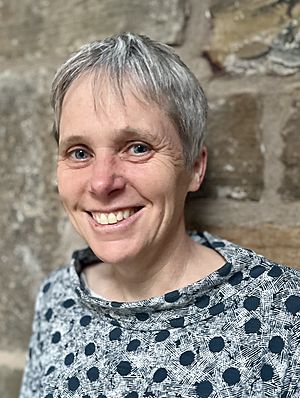Emma Hart (computer scientist) facts for kids
Quick facts for kids
Emma Hart
|
|
|---|---|
 |
|
| Born | 1967 (age 57–58) |
| Nationality | English |
| Alma mater | University of Oxford University of Edinburgh |
| Known for | Evolutionary algorithms, optimisation |
| Awards | 2018, Bronze Award in International Human-Competitive Awards (Humies) |
| Scientific career | |
| Fields | Computer science |
| Institutions | Edinburgh Napier University |
| Thesis | Immunology as a metaphor for computational information processing: Fact or fiction? (2002) |
| Doctoral advisor | Peter Ross |
Professor Emma Hart is a well-known English computer scientist. She was born in 1967. She is famous for her work on how computers can learn and solve problems. This includes ideas like artificial immune systems and evolutionary computation.
Professor Hart teaches at Edinburgh Napier University. She is also the main editor for a science magazine called Journal of Evolutionary Computation.
Contents
Early Life and Learning
Emma Hart was born in Middlesbrough, England, in 1967. She loved learning from a young age.
In 1990, she finished her first degree at the University of Oxford. She studied Chemistry and did very well.
Later, she went to the University of Edinburgh. There, she earned a Master's degree in Artificial Intelligence in 1994. Artificial Intelligence (AI) is about making computers smart.
After that, she got her PhD. This is a very high degree. For her PhD, she studied how the human immune system could inspire computers. She looked at how computers could solve tough problems. Her main teacher was Peter Ross.
Her Work as a Scientist
In 2000, Professor Hart started teaching at Edinburgh Napier University. She quickly became a top professor. By 2008, she was a Chair in Natural Computation. This means she leads a big area of study.
Today, she leads a group called CAVES. This group works on new ways for computers to solve problems. They get ideas from nature, like how animals or plants work. This is called bio-inspired computing.
Professor Hart researches how to make computers better at solving real-world problems. For example, she looks at how computers can find the best way to do things. This is called optimisation. She also studies systems that can learn and change on their own. These are called self-organising systems.
She is also the Editor-in-Chief of the Journal of Evolutionary Computation. This means she helps decide which new research papers get published.
Important Achievements
Professor Hart has received many awards for her amazing work.
- In 2016, an article she wrote about "Lifelong Learning in Optimisation" was featured.
- In 2017, she was a main speaker at a big conference on Computational Intelligence.
- In 2018, she won a Bronze Award in the International Human-Competitive Awards. This award is for computer programs that solve problems in new, human-like ways.
- In 2022, she was chosen as a Fellow of the Royal Society of Edinburgh. This is a very special honor for top scientists in Scotland.
Selected Works
Professor Hart has given many talks and written many papers.
Conference Talks
- She gave a TED talk in 2021. TED talks are famous for sharing "ideas worth spreading."

